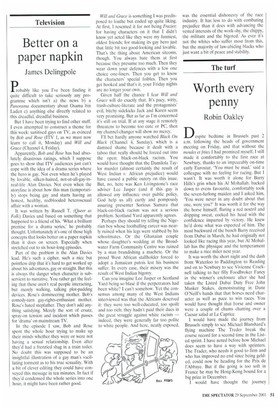Better on a paper napkin
James Delingpole
Pobably like you I've been finding it quite difficult to take seriously any programme which isn't a) the news b) a Panorama documentary about Osama bin Laden c) anything else directly related to this dreadful, dreadful business.
But I have been trying to find other stuff. I even attempted to construct a theme for this week: sanitised gays on TV, as evinced by Bob and Rose (ITV 1, as we must now learn to call it, Monday) and Will and Grace (Channel 4, Friday).
Apparently, Bob and Rose has had absolutely disastrous ratings, which I suppose goes to show that ITV audiences just can't cope with the idea of a drama series where the hero is gay. Not even when he's played by lovable, silken-haired, not-at-all-gay-inreal-life Alan Davies. Not even when the storyline is about how this man (temporarily) stops being gay and starts having an honest, healthy, redblooded heterosexual affair with a woman.
It was written by Russell T. (Queer as Folk) Davies and based on something that happened to a friend of his. 'What a brilliant premise for a drama series,' he probably thought. Unfortunately it's one of those high concepts that looks better on a paper napkin than it does on screen. Especially when stretched out to six hour-long episodes.
Part of the problem is the Alan Davies lead. He's such a cipher, such a nice but pointless drip that it's hard to get worked up about his adventures, gay or straight. But this is always the danger when character is subservient to narrative. You rather get the feeling that these aren't real people interacting, but merely walking, talking plot-padding devices. Rose's domineering mother. Bob's comedy-turn gay-rights-enthusiast mother. Rose's hated stepfather. They don't add anything satisfying. Merely the sort of ersatz, spray-on tension and incident which passes for 'drama' on mainstream TV.
In the episode I saw, Bob and Rose spent the whole hour trying to make up their minds whether they were or were not having a sexual relationship. Even after they'd had a frenzied shag in a train toilet. No doubt this was supposed to be an insightful illustration of a gay man's vacillating torment as to his true sexuality. With a bit of clever editing they could have conveyed this message in ten minutes. In fact if they'd condensed the whole series into one hour, it might have been rather good. Will and Grace is something I was predisposed to loathe but ended up quite liking. At first, I resented it for not being Frazier; for having characters on it that I didn't know yet acted like they were my funniest, oldest friends; for making its gay hero just that little bit too good-looking and lovable. That's the thing about American sitcoms, though. You always hate them at first because they presume too much. Then they wear down your defences with a few one choice one-liners. Then you get to know the characters' special foibles. Then you get hooked and that's it, your Friday nights are no longer your own.
Given half the chance I fear Will and Grace will do exactly that. It's pacy, witty, trash-culture-literate and the protagonists' evil, bitchy sidekicks Jack and Karen seem very promising. But as far as I'm concerned it's still on trial. If at any stage it remotely threatens to become too cute or PC, then my channel-changer will show no mercy.
I'll bet hardly anyone watched Black On Black (Channel 4, Sunday), which is a damned shame because it dealt with a taboo that really should be forced out into the open: black-on-black racism. You would have thought that the Damilola Taylor murder (almost certainly the result of West Indian v. African prejudice) would have caused a public outcry on this issue. But, no, here was Ken Livingstone's race adviser Lee Jasper (and if this guy is allowed any influence over public policy. God help us all) curtly and pompously assuring presenter Sorious Samura that black-on-black racism was not a serious problem. Scotland Yard apparently agrees.
Perhaps they should try telling the Nigerian boy whose footballing career was nearly ruined when his legs were stabbed by his schoolmates. Or the Ghanaian couple whose daughter's wedding at the Broadwater Farm Community Centre was ruined by a man brandishing a machete. Or the proud West African stallholder forced to adopt a Jamaican patois lest his business suffer. In every case, their misery was the result of West Indian bigotry.
Can you imagine Lee Jasper or Scotland Yard being so blasé if the perpetrators had been white? I can't somehow. Yet the consensus among many of the West Indians interviewed was that the Africans deserved it: they were too well-educated, too spoilt and too rich; they hadn't paid their dues in the great struggle against white racism — indeed, they were generally far too polite to white people. And here, neatly exposed, was the essential dishonesty of the race industry. It has less to do with combating prejudice than it does with advancing the vested interests of the work-shy, the chippy, the militant and the bigoted. As ever it's not the whites who suffer most from this, but the majority of law-abiding blacks who just want a bit of peace and stability.






































































 Previous page
Previous page